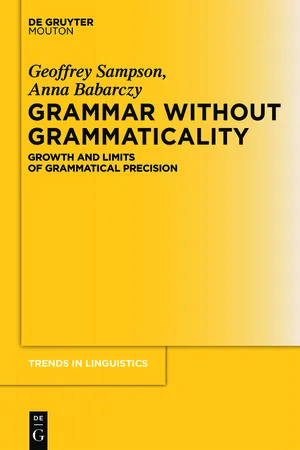
Grammar Without Grammaticality
Growth and Limits of Grammatical Precision
- 358 pages
- English
- PDF
- Available on iOS & Android
Grammar Without Grammaticality
Growth and Limits of Grammatical Precision
About this book
Linguists have standardly assumed that grammar is about identifying all and only the 'good' sentences of a language, which implies that there must be other, 'bad' sentences - but in practice most linguists know that it is hard to pin those down. The standard assumption is no more than an assumption. A century ago, grammarians did not think about their subject that way, and our book shows that the older idea was right: linguists can and should dispense with the concept 'starred sentence'. We draw on corpus data in order to support a different model of grammar, in which individuals refine positive grammatical habits to greater or lesser extents in diverse and unpredictable directions, but nothing is ever ruled out. Languages are not merely alternative methods of verbalizing universal logical forms. We use empirical evidence to shed light on the routes by which school-age children gradually expand their battery of grammatical resources, which turn out to be sometimes counter-intuitive. Our rejection of the 'starred sentence' concept has attracted considerable discussion, and we summarize the reactions and respond to our critics. The contrasting models of grammar described in this book entail contrasting pictures of human nature; our closing chapter shows that grammatical theory is not value-neutral but has an ethical dimension.
Frequently asked questions
- Essential is ideal for learners and professionals who enjoy exploring a wide range of subjects. Access the Essential Library with 800,000+ trusted titles and best-sellers across business, personal growth, and the humanities. Includes unlimited reading time and Standard Read Aloud voice.
- Complete: Perfect for advanced learners and researchers needing full, unrestricted access. Unlock 1.4M+ books across hundreds of subjects, including academic and specialized titles. The Complete Plan also includes advanced features like Premium Read Aloud and Research Assistant.
Please note we cannot support devices running on iOS 13 and Android 7 or earlier. Learn more about using the app.
Information
Table of contents
- Preface
- Acknowledgements
- Table of contents
- List of figures
- List of tables
- Chapter 1. Introduction
- Chapter 2. The bounds of grammatical refinement
- Chapter 3. Where should annotation stop?
- Chapter 4. Grammar without grammaticality
- Chapter 5. Replies to our critics
- Chapter 6. Grammatical description meets spontaneous speech
- Chapter 7. Demographic correlates of speech complexity
- Chapter 8. The structure of children’s writing
- Chapter 9. Child writing and discourse organization
- Chapter 10. Simple grammars and new grammars
- Chapter 11. The case of the vanishing perfect
- Chapter 12. Testing a metric for parse accuracy
- Chapter 13. Linguistics empirical and unempirical
- Chapter 14. William Gladstone as linguist
- Chapter 15. Minds in Uniform: How generative linguistics regiments culture, and why it shouldn’t
- References
- Index